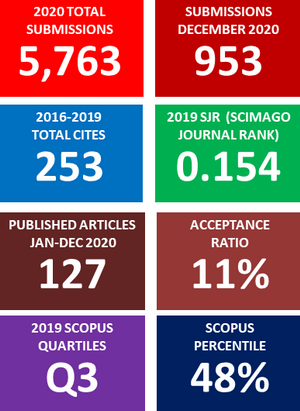Zero Waste Management to Increase Efficiency in Palm Oil Production and Processing for Food Security in Thailand
Keywords:
Zero waste management, palm oil production, food security, oil palm, palm oilAbstract
This study aims to analyze the structure of palm oil production and government policies related to the stability of food consumption in order to meet the future demand in the next 20 years (2014 - 2034). Applying the principle of zero waste management, the study uses a market value approach by assessing the value of all remainders of oil palms. The remains of oil palms, such as debris, leaves, stem, and shell fiber, were valuated. These remains were converted to fertilizers. Organic wastewater from the crude palm oil production process is used to produce electricity. The value of these remains is approximately 919.35 million USD per year consisting of: (1) the weight of all debris, palm leaves, and shell fiber in Thailand is about 3.64 million tons per year, equivalent to 243.44 million USD of fertilizers; (2) the weight of palm oil trunks is 89,958 tons per year, equivalent to 6.00 million USD of fertilizers; (3) the weight of empty fruit bunches, palm fiber, and waste water is 2.86 million tons per year; equivalent to 191.21 million USD of fertilizers; (4) the weight of fiber and palm shell from crude palm oil extraction process is 7.13 million tons; equivalent to 476.85 million USD of fertilizers; (5) wastewater from palm oil mill is 9.62 million cubic meter per year; equivalent to 1.85 million USD of electricity. The total value of using oil palm remains is 919.35 million USD per year.Downloads
Metrics
References
Senate Committee on Agriculture. The Study of Problem of Oil Palm in Thailand. Senate Committee on Agriculture, Thailand, 2013.
Land Development Department. Statement Documents of Subcommittee to study the Issue of Palm Oil: Analysis to Determine Target Areas to Expand Oil Palm Plantations. Ministry of Agriculture and Cooperatives, Bangkok, Thailand, 2012.
Suratthani Oil Palm Research Center. Surat Oil Palm Newsletters. Department of Agriculture. Ministry of Agriculture and Cooperatives, Sitiprasert Printing, Suratthani, Thailand, 2008.
Agricultural Economic Research. The Results of the Planned Development of Palm Oil and Palm Oil Year 2008 - 2012. Office of Agricultural Economics. Ministry of Agriculture and Cooperatives, Bangkok, 2012, Thailand.
United Sates Department of Agriculture. The World Oil Output Between 2011/12 - 2014/15. Available at: http://www.usda.gov/wps/portal/usda/usdahome, accessed April 2015.
Agricultural Economic Research. Agricultural Economics Basics Information Year 2011. Office of Agricultural Economics. Ministry of Agriculture and Cooperatives, Agricultural Cooperatives of Thailand, 2012, p. 28-9.
Ministry of Industry. Statement Documents of Subcommittee to Study the Issue of Palm Oil: Palm Oil Industry. Ministry of Industry, Thailand, 2012.
Department of Internal Trade. Oil Palm and Palm Oil Production in Thailand. Available at: http://agri.dit.go.th/web_dit_sec4/home/index.aspx, accessed April 2015.
A Kawekong. Composting of Grass Clipping, Dry Leaves and Wastewater Sludge by Ventilated Pile. Chiang Mai University, Thailand, 1997.
H Haslenda and MZ Jamaludin. Industry to industry by-products exchange network towards zero waste in palm oil refining processes. Resour. Conservat. Recycl. 2011; 55, 713-8.
S Sumathi, SP Chai and AR Mohamed. Utilization of oil palm as a source of renewable energy in Malaysia. Renew. Sustain. Energ. Rev. 2008; 12, 2404-21.
S Siangjaeo, S Gheewala, K Unnanon and A Chidthaisong. Implications of land use change on the life cycle greenhouse gas emissions from palm biodiesel production in Thailand. Energ. Sustain. Dev. 2011; 15, 1-7.
T Silalertruksa, S Bonnet and SH Gheewala. Life cycle costing and externalities of palm oil biodiesel in Thailand. J. Clean. Prod. 2012; 28, 225-32.
PA Dorosh, S Dradri and S Haggblade. Regional trade, government policy and food security: Recent evidence from Zambia. Food Pol. 2009; 34, 350-66.
F Boons and A Mendoza. Constructing sustainable palm oil: How actors define sustainability. J. Clean. Prod. 2010; 18, 1689-95.
RH Corley. How much palm oil do we need? Environ. Sci. Pol. 2009; 12, 134-9.
JF McCarthy, P Gillespie and Z Zen. Swimming upstream: Local Indonesian production networks in “Glogalized” palm oil production. World Dev. 2012; 40, 555-69.
B Wicke, R Sikkema, V Dornburg and A Faaij. Exploring land use changes and the role of palm oil production in Indonesia and Malaysia. Land Use Pol. 2011; 28, 193-206.
W Boonyaprateeprat. Statement Documents of Subcommittee to Study the Issue of Palm oil: The Production and Marketing of Palm Oil and Palm Oil in the World and Thailand, 2012.
Ministry of Agriculture and Cooperatives. The Push and Drive the Restructuring of Agriculture and Industry to Create Value. Ministry of Agriculture and Cooperatives, Bangkok, Thailand, 2010.
Department of Industrial Works. Statement Documents of Subcommittee to Study the Issue of Palm Oil: The Plant Permit, 2012.
Agricultural Economic Research. Agricultural Product Situation and Trends Year 2013. Office of Agricultural Economics, Ministry of Agriculture and Cooperatives, Bangkok, 2012, p. 162.
MK Lam, KT Tan, KT Lee and AR Mohamed. Malaysian palm oil: Surviving the food versus fuel dispute for a sustainable future. Renew. Sustain. Energ. Rev. 2009; 13, 1456-64.
The Thailand Development Research Institute. The Project of Guidelines and Supply Chain Management: Logistics of Agricultural Products under the Project, Research and Evaluation, to Propose Policy Guidelines for Restructuring the Manufacturing Sector, Trade and Investment. 2010.
Subcommittee to Study the Issue of Palm Oil. The Senate Agriculture Committee. 1st - 7th Meeting Memorandum. The Thailand Development Research Institute, Bangkok, Thailand, 2012.
Subcommittee to Study the Issue of Palm Oil. The Senate Agriculture Committee. 1st - 28th Meeting Memorandum. The Thailand Development Research Institute, Bangkok, Thailand, 2013.
Downloads
Published
How to Cite
Issue
Section
License
Copyright (c) 2016 Walailak Journal of Science and Technology (WJST)

This work is licensed under a Creative Commons Attribution-NonCommercial-NoDerivatives 4.0 International License.









